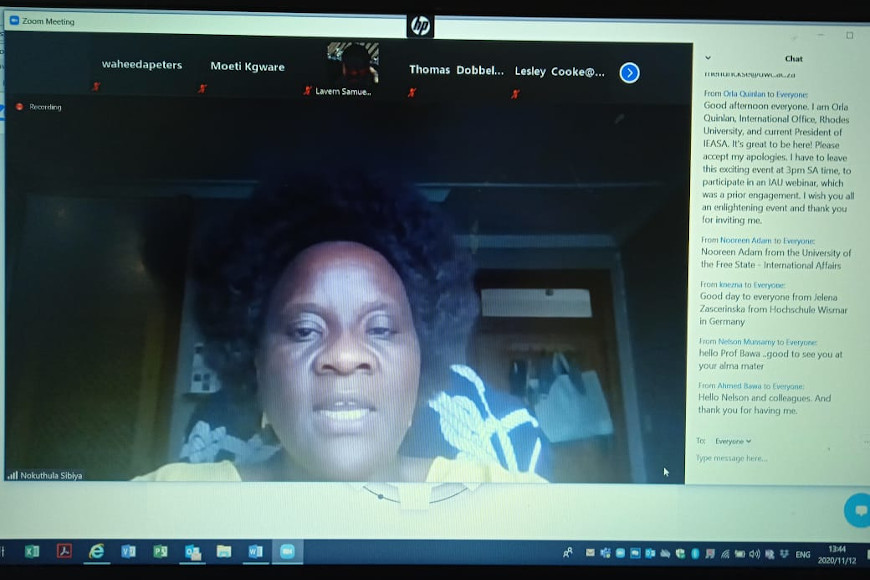The Launch of the Collaborative Online International Learning at the Durban University of Technology-COIL@DUT: A Clarion Call to ENVISION 2030 And Taking COIL To New Levels, took place last Thursday, on 12 November 2020 via Zoom.
DUT’s Dr Lavern Samuels, Director: International Education and Partnerships, gave the welcoming address and overview of the launch, sharing more insight on the plans of taking COIL to new levels at the institution and beyond.
Professor Sibusiso Moyo, Deputy Vice-Chancellor (DVC): Research, Innovation and Engagement at DUT, welcomed local and international guests and thanked all those who made the launch possible, congratulating the organisers of the launch of COIL@DUT, faculty members, students and DUT partners for working together to take COIL to new levels, as well as DUT as a leader in COIL on the continent.
She also emphasised more on the university attributes, the footprint of DUT and what COIL means in the context of the university.
“We have over 30 000 students, 95% of these students are undergraduate students, 5% are postgraduate students. Our cohort of postgraduate students is an area that we are currently trying to grow. In terms of staffing, currently, we have our 600 identified academics over which 30% have PHDs. So, these statistics are important in the context of COIL because for us, we see this platform as one for not just to expose our students, but also different types of teaching and learning experiences; especially in terms of our staff in forming partnerships, learning from each other and enhancing our curriculum,” she said.
Prof Moyo also relayed that the global pandemic, COVID-19, has shown everyone how things in the world can change rapidly and how job insecurity, health risks and economic instability can affect the education system, society and the graduates’ chances for employability.
“Universities must themselves be adaptive to changes and redesign curricula to respond to rapid changes and the need to ensure our graduates have 21st century skills that can help them respond and adapt, even through tough economic meltdowns,” she said.
Deputy Vice-Chancellor: Teaching and Learning at DUT, Professor Nokuthula Sibiya gave insight on COIL implications for teaching and learning, especially in the context of DUT Envision 2030.
“Institutions of higher learning today are faced with the challenge of providing unique academic opportunities used for learning that in many cases use technology, end up as a full online or blended curriculum, however it is not simply offering online or blended courses that matter, but what you do with those technologies that make the difference for students today,” she said.
Prof Sibiya specified that the Division of Teaching and Learning in terms of its plan requires the institution to have 15 new COIL projects across the University, and she hopes the launch of COIL@DUT will help DUT to achieve its targets.
DUT’s Professor Ashley Ross elaborated more on Envision 2030: Re-imagining the university as an agent of societal change. Invited guest speaker, Orla Quinlan, Director of Internationalisation at Rhodes University and President of Institute of Estate Agents of South Africa(IEASA), gave more context to the contemporary global context and the importance of COIL in international higher education.
“The Network of International Education Associations (NIEA) recognises that COVID-19 pandemic has had an enormous impact on Higher Education and on Internationalisation of Higher Education in particular,” she said.
She also indicated that at the same time, NIEA believes that the solutions to the challenges posed by the COVID-19 pandemic require international collaboration and reaffirms the importance of international higher education, as international collaboration is essential to finding solutions to global problems, which manifest differently in the local contexts.
“Higher education institutions must internationalise their curricula in order to provide an alternative mode of internationalisation that can overcome the limitations inherent in international mobility schemes that remain accessible to a minority of students. The NIEA and Department of Higher Education and Training (DHET) call for COIL is explicit. COIL offers a creative, relevant, accessible way of engaging in international teaching and learning. Partners working on COIL programmes can share content and methodology, in mutually beneficial ways,” she said.
Quinlan said she wishes DUT every success and looks forward to DUT becoming leaders in the delivery of COIL programmes.
Dr Lavern Samuels also officially revealed the exciting new COIL Logo with the Igniting COIL@DUT tagline to the online audience. Also talking at the online launch was CEO of Universities South Africa, Professor Ahmed Bawa, who added more on the importance of innovation in the internationalisation of higher education, whilst Dr Adam Zahn (Director of Global Engagement in the Office of Global Engagement at the Drexel University), Hope Windle (Instructional Designer at SUNY Ulster), and Eva Haug (Coordinator Internationalisation and Senior Lecturer of Intercultural Competence at the Amsterdam University of Applied Sciences, gave their presentations on how COIL works for their institutions and their COIL partnerships with DUT.
Windle spoke on the collaboration of students from the State University of New York (SUNY) and DUT students as well as how the relationship between SUNY and DUT has grown over the years.
DUT’s Dr Penny Orton, Lesley Anne Cooke spoke on the reflections on COIL at DUT. COILERS at DUT, Evonne Singh, Dr Ashika Naicker, Dr Cleo Prince, Professor Sanja Bauk, described their COIL projects and student voices.
Director: Office for International Affairs, University of the Free State, Cornelius Hagenmeier, delved more on developing COIL capacity through collaborations as well as the role of DUT in the iKudu Project.
Dr Samuels gave the vote of thanks and stressed that COIL at DUT provides a platform that enables both students and academics to be engaged in ‘virtual exchange and collaborative’ platforms, and hopes DUT forges more COIL international partnerships, going forward.
Pictured: Deputy Vice-Chancellor: Teaching and Learning at DUT, Professor Nokuthula Sibiya, speaking at the online launch.
Waheeda Peters


